Sudeki
It was meant to reshape the world of RPGs. Instead, it just reshapes what was already in it, and lacks conviction in doing so.
When Microsoft originally announced Sudeki, at a press event in Seville a couple of years ago, we were told it would change what we came to expect from a role-playing game. Given the vastness and pedigree of the competition, perhaps it will come as little surprise that it doesn't. What may come as a surprise though is our rather tiring decision to snipe at the marketing rhetoric by way of an introduction. Honestly, we're sorry about that, but in the case of Climax and Microsoft's ambitious RPG, it seems rather fitting; not only do our expectations and desires for future RPGs remain unshifted by their work, but within the framework of what's on offer it's difficult to think of anything at all that caught us by surprise. So what better way to kick off than with a cliché, right?
Thoughtless
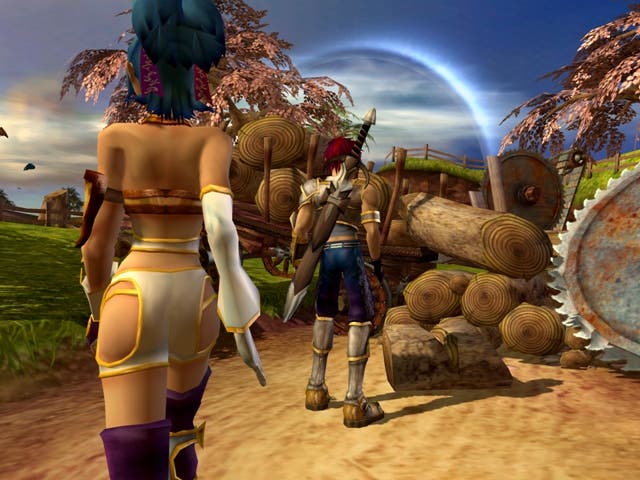
Sudeki's problem isn't that it's fundamentally a bad game. It's more that it's just too scattershot in its approach. Intelligent ideas, like a satisfying real-time combat system that mixes Phantasy Star Online-style timed combo attacks and dazzling Final Fantasy-issue spellcasting, are never more than a few steps removed from insultingly straightforward boss encounters, hackneyed writing and voice acting, and trivial puzzles that are barely fit to lick the ground that Zelda walks upon, let alone plant lips on its boot. And for some reason, despite lavish visuals and the core of a half-decent story, too many key elements are just devoid of imagination; perhaps either the product of focus groups and committees, or just someone's idea of how a Japanese RPG generally behaves.
The idea, then, is that the world of Sudeki has been torn into light and shadow by some sort of godly unhappiness, and the citizens of both are starting to come to terms with this predicament - all the while an uber-nasty lurks over the ethereal horizon, his agents toiling away in secrecy in an attempt to resurrect him. Your job is to guide four characters from different backgrounds on a fairly one-way mission to gather some crystals, which the kingdom of Illumina hopes to use to reinforce their position and ward off raids from nasties beyond the rift. You do this, surprisingly enough, by visiting towns containing shops, blacksmiths, inns and vast numbers of NPCs circling with a line or two of dialogue; battling hordes of randomly spawning enemies in-between (generally whenever you happen into a clearing big enough for the game to fence off at either end without you escaping); and tackling the occasional dungeon area, densely packed with battles, menial puzzles and an eventual boss encounter. And there are all sorts of plot twists and sub-dramas along the way. Or at least, there ought to be.
Ishn't that fvunny?
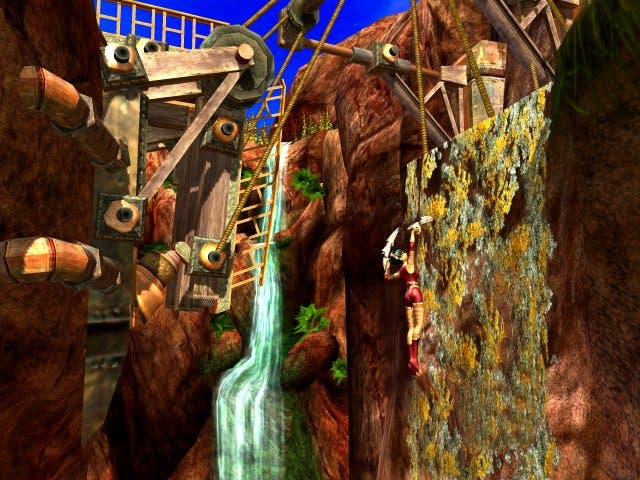
The most irritating thing - and the flaw that underscores most of the game's problems - is the line-up of characters. Brought together in a roundabout way by some ancient prophecy, the four adventurers - Tal, Ailish, Buki and Elco - are an incongruous bunch, and the script never has the strength to justify their union, nor give us cause to empathise with them individually. Compared to their generic contemporaries, there's nothing memorable about any of them. Tal, the sword-wielding pseudo-leader of the bunch, is decked out in the bright but forgettable armour of the Illumina Guard, and has a big sword and red hair. There's very little to latch onto about him; even his back-story - the loss of his brother, the estrangement of his father - is clichéd and the script is powerless to give it any real significance. Not content with that, after a while it gives up and we hear no more about it anyway. Contrast that with some of the heart-wrenching inner turmoil we've seen Squaresoft characters wrestle with over the years and you'll feel short-changed.
The others are no better. Ailish is almost nothing but eye candy, decked out in a fusion of hot pants, thigh boots, torn swimsuit and Amazonian brassiere, with holes scattered wherever skin can peep through revealingly without exciting the censors, and her motivation - that she wants to prove her independence to her mother the Queen - is worn out and undermined by the fact that you'll hate her mother anyway. Something that nobody in the game seems willing to touch upon. Buki and Elco, meanwhile, are the religious and scientific zealots (Buki's a cat woman warrior thing, and Elco is a scientist with a mechanical arm and a gun), and over the course of the game they gradually come to accept one another's beliefs, and stop saying "It was written" and looking sceptical about everything in turns.
However it would perhaps be better if they said nothing at all. The widespread voice acting, often seized upon in the run-up as one of the game's great achievements, is almost universally dire, and the four main characters can be the worst offenders. Elco, most notably, sounds like Goldmember from Austin Powers - and even if you haven't seen that movie, you'll probably still think he sounds like an arse. Of the others, only Ailish's voice could fit her background, and, given that she's the romantic lead, listening to the giddy yelping of someone poshly acting out a twelve year-old princess is more of a hindrance than anything else. As for the supporting cast, we're stuck for where to begin. Do we focus on the menacingly camp German trader? The various 'honest, guv' types who fill out the farming and menial jobs? The queen herself? Given that the world of Sudeki isn't really that big, and can be covered at a trot within a few minutes, it's hard to imagine how all these diverse accents managed to unite. Wouldn't it have made more sense to go for consistency, rather than to grab one of Heathrow's departure lounges and shake the contents into a recording booth?
Enduring
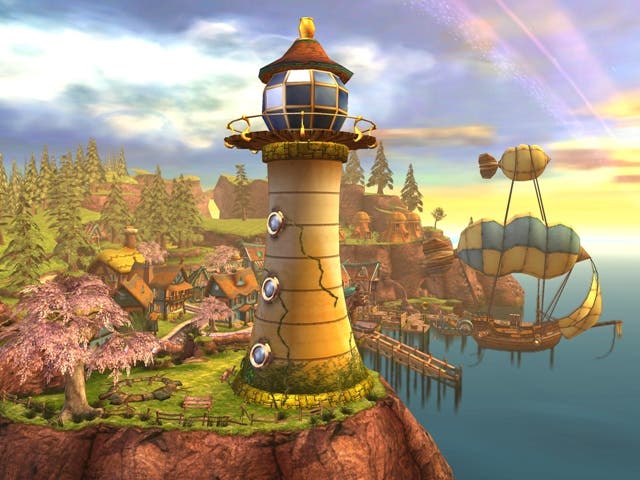
All right, we're getting a bit carried away, but Sudeki does that to us, you see. As much as we enjoy some elements of it, pad-in-hand, we only have to turn it off for five minutes and in our mind we're stuck with the things we disliked. It's a game that, for all its creditable aspects, only seems to leave us with unhappy memories. We look back and our mind doesn't leap to the system of levelling up, which allows us to upgrade one individual aspect per level from a selection of health points, magic points, attacking power and magical power, or just unlock a new spell. Nor do we immediately remember grafting different runes onto our sword and armour to ward off various spells and save cash on lifting curses. Though, in both cases, they are good ideas, well implemented.
Instead, we seem to focus on the story, which is handled awkwardly by both scriptwriters and voice actors, the dungeon design, which is despairingly simplistic, the side quests, which involve fetching things and rarely inspire any interest, and the musical score, of which only one or two pieces really stick in the mind (the Crystal Reef tune, perhaps). We wouldn't buy the soundtrack CD, quite frankly, and for all its attempts at ambience and atmosphere building, the subtlety feels completely misplaced in a world of garish colours and equally garish personalities.
But if we can pay tribute to one thing above all others, it should be the combat, because were it not for the approach Climax has taken here, we wouldn't have lasted much beyond the first couple of hours. The idea is that Tal and Buki use melee attacks with a combination of the A and X buttons, while Ailish and Elco dip into first-person and use ranged weapons. All four can also call upon various magical attacks - purchased, as we mentioned, using points gathered when they level up - and you can cycle through them all at any time in battle using the black and white buttons. The melee side of it involves timing three successive strikes to perform a combo attack, and by mixing up the order of A and X, you perform variations, some of which are short and sharp, hitting most enemies before they can react, and some of which are a bit more drawn out and cause more damage, but can be scythed down before you land them if your target is in good shape.
Four Swords (well, a sword, two guns and some knives)
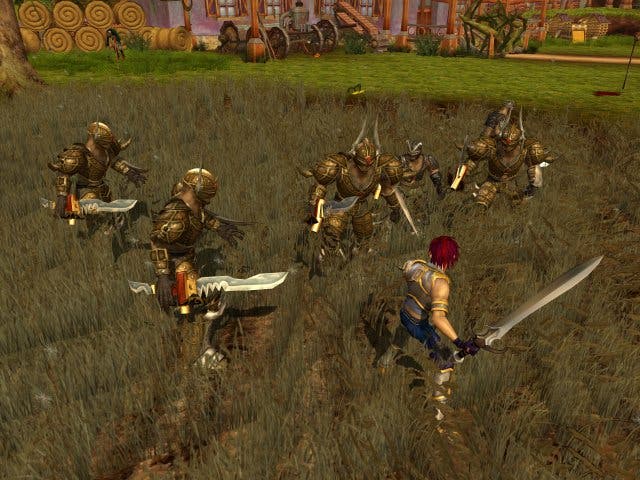
Obviously with four characters, three of them are going to working under their own recognisance a lot of the time, and this is arguably the biggest problem with the otherwise enjoyable combat; AI behaviour is often a bit dense. You will want to set them to defend rather than anything else, as then you can at least hope they'll stay out of harm's way more often than not. Otherwise you may find that you have to keep taking time out in order to use healing items, which can be a bit fiddly in the thick of things. Items can be mapped to the D-pad for quick access, but there are several variations on the key ones, and loads more besides, and if you run out of one type, you'll have to delve into the menus proper instead - and the quick-mapping interface isn't available again during combat, while the in-battle menu only slows things down to a crawl rather than pausing proceedings, so there's a time element to your dabbling anyway.
Fortunately, you soon gain various spells that bolster your defence - as well as smashing through the enemy's. Dubbed 'skill strikes', these can up the power of your basic weapons, limit the damage you'll take, heal your party over time, or - on the other hand - cause massive damage by summoning beasts, earthquakes, walls of flame and all the other usual suspects, and in every case the spell's potency ties in with each character's Essence rating - which is where the element of strategy in levelling up becomes apparent. You can just boost your health points until they seem virtually unassailable, but if you can't bring down enemies quickly enough then you're going to wind up losing them anyway. It's a delicate balance. There's also the question of when you use your 'spirit strikes' - devastating attacks that often destroy all the opposition in one go, but can only be used once you've built up a particular power gage after several hard fought battles.
Puzzling
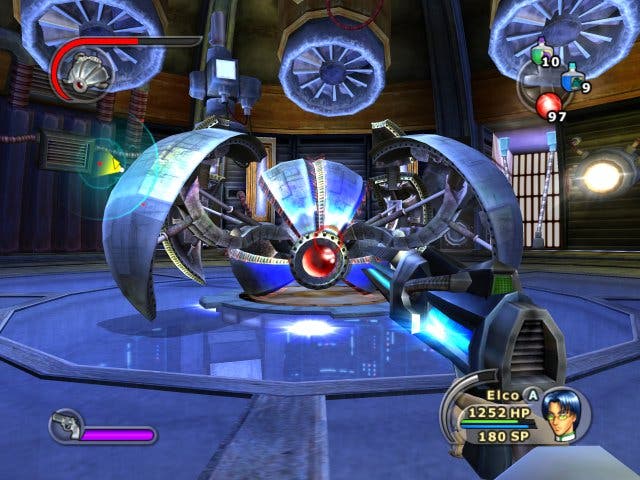
But while we found the combat more and more interesting over the course of the game, there isn't much else that develops equivalently - not the story, which is sabotaged by the spoken dialogue and obvious telegraphing of key events; not the characters, whose own back-stories seem to peter out as their mission takes hold; not the boss encounters, which are a steady procession of simple confrontations, either overlong or bizarrely fleeting (and often limited to just one character, which can be a big problem if you've been paying less attention to him or her); and not the world design, which is consistent, if only in the sense that it never really goes anywhere new.
The puzzles, if you can call them that, are so obvious that you won't have any trouble figuring them out as long as you can remember which character has which ability - Tal can push and pull blocks, Ailish can 'dispel' invisible objects, Buki can climb certain surfaces, and Elco can use his jetpack when shiny orange rocks are around to power it. That takes care of most things, and the other puzzles are extremely boneheaded. A rather amusing example in the mountainous robot/academy city of Transentia gives you a pair of codes made up of ones and zeroes, and switches numbered one to four to input them. What does it mean? Well, you can see what it means, because there's a blackboard sat ten feet away with "UP=1, DOWN=0" written on it. The toughest things are the substitution problems with switches and bridges, which trial and error successfully navigates anyway, and other than that it's more or less plain sailing the second you clap eyes on the problem. Perhaps the game is aiming for a Zelda feel in some areas with its mixture of puzzles and fights (which can't be avoided, incidentally, despite the Action RPG pretext), but if it is then Climax misses the point completely.
The saddest thing about Sudeki though is that it's really not all bad, and it's not an unpleasant game to play, although that may be because it's more boring than frustrating, we suppose. But with the strength of the combat system and the obvious technical capabilities of the engine, you feel that the right hands could have shaped something truly memorable. As it is, the game world may be lavishly decorated (although more so early on with the corpse-strewn road to New Brightwater, and that town itself, than in some of the later sections like the Grotto dungeon and subsequent road to Cyantine), but the vivid colours and delicate touches, like seagulls flapping back and forward between fountains and rooftops, are married to textbook RPG locations that never really had much of an impact on us. Standout moments, for us, were limited to certain boss encounters and visitations from your spiritual guide Tetsu. Perhaps we've been spoilt in the past. Perhaps we've played too many RPGs. But then, wasn't Sudeki meant to reshape our expectations?
Failed Fantasy
In the end, we're forced to return to the issue of memories. Because, despite building most of the game upon fondly remembered Japanese RPGs, Sudeki doesn't really leave us with any that justify the time we invested in it. And even its cleverest ideas are generally just amalgamations of things we've seen before - like a puzzle where you have to replicate a five-tone tune by touching five symbols on the ground in the right order. It fails to take advantage of so many breaks - the technology, the voice actors at its disposal, the potential for the synchronicity of the two worlds, the use of four characters in designing dungeons. There will be enough here to keep most gamers interested, although it's certainly not scintillating by any stretch, but for us, disappointment is the overwhelming theme - not because it's bad, but because it could have been really good.
Sudeki is due out in Europe on August 27th.

